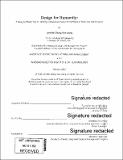| dc.contributor.author | Leung, Jennifer Chung Yan. | en_US |
| dc.contributor.other | Massachusetts Institute of Technology. Integrated Design and Management Program. | en_US |
| dc.contributor.other | Massachusetts Institute of Technology. Engineering and Management Program. | en_US |
| dc.contributor.other | System Design and Management Program. | en_US |
| dc.date.accessioned | 2022-08-31T16:29:42Z | |
| dc.date.available | 2022-08-31T16:29:42Z | |
| dc.date.copyright | 2020 | en_US |
| dc.date.issued | 2020 | en_US |
| dc.identifier.uri | https://hdl.handle.net/1721.1/145241 | |
| dc.description | Thesis: S.M. in Engineering and Management, Massachusetts Institute of Technology, System Design and Management Program, May, 2020 | en_US |
| dc.description | Cataloged from PDF version of thesis. | en_US |
| dc.description | Includes bibliographical references (pages 39-40). | en_US |
| dc.description.abstract | Products and services are created by makers of various backgrounds and different degrees of understanding of design methodology. At best, makers use human-centred methodologies that narrow down the target users to a set of needs. Solutions are designed out of that narrowed set of needs, tested against that set of needs and put into production. There is very little incentive and effort to examine the potential inadvertent effects that a solution may have on the user, their community, and the society as a whole once it's placed into the real world. In this thesis, I created a framework that would help makers evaluate the effects a proposed product or service is going to have on the user and society. This framework is meant to be used as a tool to help evaluate potential solutions before production. It breaks down the analysis of potential inadvertent effects into smaller pieces, allowing the makers to analyze how their solution may interact with the world on an individual, communal, and societal level. The intention of the framework is to surface both beneficial and detrimental inadvertent effects and inspire action for the maker. | en_US |
| dc.description.statementofresponsibility | by Jennifer Chung Yan Leung. | en_US |
| dc.format.extent | 40 pages | en_US |
| dc.language.iso | eng | en_US |
| dc.publisher | Massachusetts Institute of Technology | en_US |
| dc.rights | MIT theses may be protected by copyright. Please reuse MIT thesis content according to the MIT Libraries Permissions Policy, which is available through the URL provided. | en_US |
| dc.rights.uri | http://dspace.mit.edu/handle/1721.1/7582 | en_US |
| dc.subject | Integrated Design and Management Program. | en_US |
| dc.subject | Engineering and Management Program. | en_US |
| dc.subject | System Design and Management Program. | en_US |
| dc.title | Design for humanity : a design-phase tool to identify and assess inadvertent effects of products and services | en_US |
| dc.title.alternative | Design-phase tool to identify and assess inadvertent effects of products and services | en_US |
| dc.type | Thesis | en_US |
| dc.description.degree | S.M. in Engineering and Management | en_US |
| dc.contributor.department | Massachusetts Institute of Technology. Integrated Design and Management Program | en_US |
| dc.contributor.department | Massachusetts Institute of Technology. Engineering and Management Program | en_US |
| dc.contributor.department | System Design and Management Program. | en_US |
| dc.identifier.oclc | 1342001565 | en_US |
| dc.description.collection | S.M. in Engineering and Management Massachusetts Institute of Technology, System Design and Management Program | en_US |
| dspace.imported | 2022-08-31T16:29:42Z | en_US |
| mit.thesis.degree | Master | en_US |
| mit.thesis.department | Sloan | en_US |
